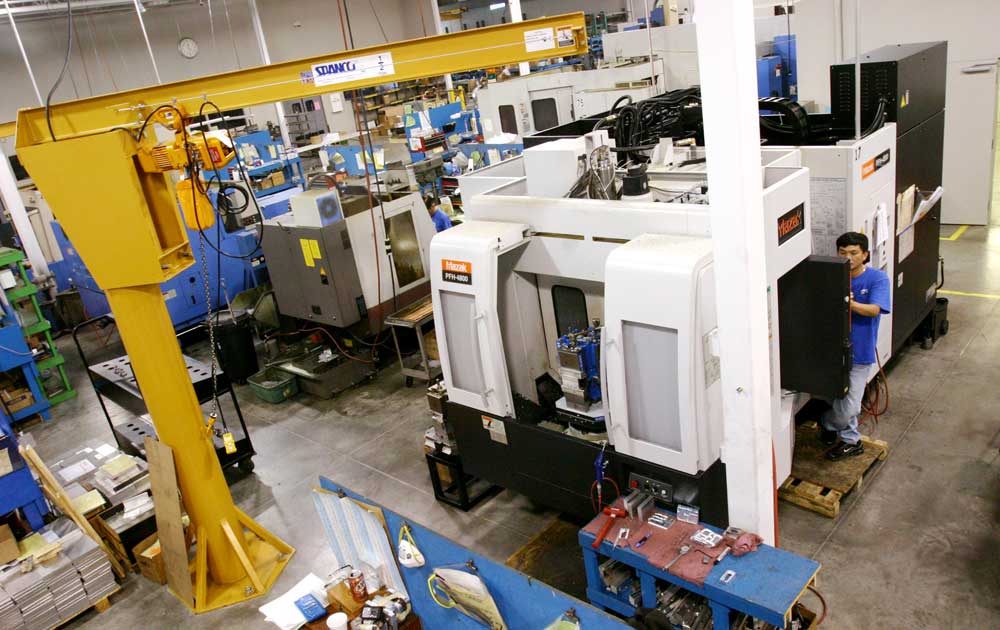In today’s fast-evolving aerospace landscape, innovation is happening at record speed, and with it comes the urgent need to scale production without compromising on quality or performance. Whether it’s for next-gen commercial aircraft or cutting-edge defense systems, the pressure is on to deliver complex, high-precision parts faster, in greater volumes, and with absolute consistency.
Scaling aerospace component production often involves balancing ultra-tight tolerances, complex geometries, and strict regulatory standards with the need for speed, consistency, and cost-efficiency at high volumes. This means the work doesn’t stop at design — it extends to anticipating production challenges, choosing the right manufacturing partners, and ensuring the path from prototype to production is built for scale.
In this article, we’ll examine the key challenges engineers encounter when scaling the production of CNC machined aerospace components. We’ll also discuss how partnering with an experienced manufacturer like MME can help navigate these complexities, ensuring consistent quality, performance, and scalability throughout the production process.
Common Challenges in Scaling Production
Maintaining Ultra-Tight Tolerances at Scale
In the aerospace industry, precision isn’t optional, it’s mission-critical. But maintaining ultra-tight tolerances across thousands of parts is a different game than prototyping a dozen. The more parts produced, the higher the risk of quality drift, especially during ramp-up phases or machine shifts. Small variations, if left unchecked, can quickly escalate into compliance issues or in-field failures.
Managing Complex Geometries and Advanced Materials
Engineers are designing increasingly complex components to achieve lighter weight, greater strength, and higher performance. These parts often feature intricate geometries that demand multi-axis machining and advanced tooling strategies. Scaling production of CNC machined parts for aerospace becomes even more challenging when working with aerospace-grade alloys or composites, which require specialized expertise due to their difficult machining properties.
Ensuring Consistent Quality Across Every Part
Traditional inspection methods like manual gauges or sample-based QC fall short in high-volume production. With so many critical features per part, relying on manual checks introduces risk. Engineers need confidence that every component, not just every tenth, meets spec. This demands a quality system capable of real-time, in-process verification.
Meeting Aerospace Regulatory and Certification Requirements
Aerospace manufacturing isn’t just about making good parts — it’s about making them under strict compliance standards like AS9100, NADCAP, and customer-specific quality protocols. Engineers must ensure their suppliers have systems in place for full traceability, documented process control, and audit readiness from day one.
Balancing Lead Times, Costs, and Production Speed
OEMs and Tier 1 suppliers want faster delivery, often with little room for delay. But accelerating production without a scalable and robust setup risks errors, rework, or missed compliance checkpoints. Without the right infrastructure, speed and quality can’t coexist.
How a Quality Manufacturer Solves These Challenges
Investing in Advanced CNC Machining Technology
A quality manufacturer invests in advanced machining capabilities to ensure precision and efficiency at scale. High-volume production of CNC machined parts for aerospace requires a combination of high-performance equipment, such as multi-axis machining centers and Swiss turning capabilities, supported by modern manufacturing technologies that improve repeatability, reduce changeover times, and maintain consistent throughput, even as production volumes grow.
Leveraging Expert Engineering and Production Planning
Scalable production starts at the design stage. Experienced CNC manufacturers like MME, collaborate with engineering teams early to refine part designs, improve manufacturability, and avoid downstream issues. Smart planning of tooling, material flow, and workholding strategies ensures smoother scale-up. A strong manufacturing partner will also use automated scheduling systems and a reliable ERP platform to support scalability. These systems allow for accurate forecasting, automatic order entry, and access to custom reports that provide clear visibility into production capacity. With this level of insight, you can level-load production and manage resources effectively. Many small shops operate without this infrastructure, so choosing a manufacturer that has invested in these capabilities can make a significant difference in both quality and long-term growth.
Implementing Automated, In-Process Quality Assurance
Instead of inspecting after the fact, leading manufacturers integrate quality checks directly into the machining process. This real-time data capture minimizes scrap, improves consistency, and ensures every part is held to standard.
Building Regulatory Compliance into Production Systems
Compliance doesn’t begin at inspection, it starts with process design. Aerospace-certified manufacturers build their systems to support full traceability, documentation, and control from material receipt through final inspection.
Designing Production for Scalability from the Start
In high-volume aerospace production, true scalability is defined by the ability to maintain quality and consistency at high volumes. That means choosing materials that are both aerospace-grade and readily available, designing fixtures that support repeatability, and ensuring machine capacity aligns with demand.
Why Choosing the Right CNC Partner Matters
Choosing the right CNC partner is critical to scaling success. A trusted manufacturer brings more than machines — they offer deep aerospace experience, proactive engineering collaboration, and proven systems that de-risk production at every stage.
At MME, we specialize in high-volume production of CNC machined parts for aerospace. With aerospace-certified quality systems, advanced machining capabilities, and a proven track record of success, we help engineers bridge the gap between precision design and scalable production.
Want to learn how MME can support your aerospace programs with scalable, precision manufacturing? Explore our aerospace capabilities today!

